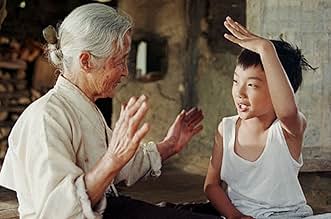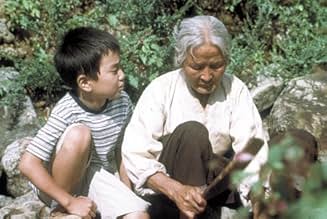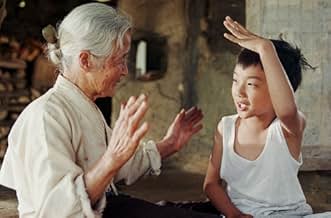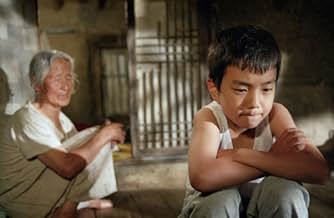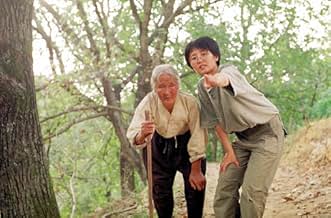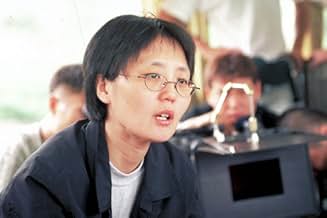IMDb RATING
7.7/10
6.2K
YOUR RATING
This is the story of a 7-year-old boy, Sang-woo, born and raised in the big city, and his mute grandmother, who has spent her whole life in a small rural village.This is the story of a 7-year-old boy, Sang-woo, born and raised in the big city, and his mute grandmother, who has spent her whole life in a small rural village.This is the story of a 7-year-old boy, Sang-woo, born and raised in the big city, and his mute grandmother, who has spent her whole life in a small rural village.
- Awards
- 12 wins & 10 nominations total
- Director
- Writer
- All cast & crew
- Production, box office & more at IMDbPro
Featured reviews
You should not always judge a movie by its covers! "Jibeuro" or "The Way Home" is an amazingly beautiful movie. The story is heartfelt and warm, touching and to the point.
The characters in the movie, despite being limited to a few central characters, are very well portrayed and the actors/actresses really bring their roles to life on the screen.
If the story of this movie does not move you or touches you, then you are without a heart. It is one of the more beautiful movies that I have watched. "The Way Home" tells a touching story of differences between youth and elderly, the importance of values in life, and it does so with compelling sincerity that will leave you in tears. Throughout the movie I grew angry at the child, at how he could treat his loving grandmother that way, and my heart went out for the grandmother and her endless love and acceptance. This movie is one of a kind!
I was told to watch this movie, and were somewhat reluctant, given the cover of the movie and what it read on the back cover. But I sat down and saw it, and I was moved. This is definitely a heartfelt movie that will stay with you for a long, long time.
The characters in the movie, despite being limited to a few central characters, are very well portrayed and the actors/actresses really bring their roles to life on the screen.
If the story of this movie does not move you or touches you, then you are without a heart. It is one of the more beautiful movies that I have watched. "The Way Home" tells a touching story of differences between youth and elderly, the importance of values in life, and it does so with compelling sincerity that will leave you in tears. Throughout the movie I grew angry at the child, at how he could treat his loving grandmother that way, and my heart went out for the grandmother and her endless love and acceptance. This movie is one of a kind!
I was told to watch this movie, and were somewhat reluctant, given the cover of the movie and what it read on the back cover. But I sat down and saw it, and I was moved. This is definitely a heartfelt movie that will stay with you for a long, long time.
10Jamester
This is a most touching and honest love story. 'Love story', you may wonder?? Are we talking about the same movie? Indeed, the Way Home is a story about a grandson and grandmother with love in the agape tone as it's central theme. Perhaps it's because of the distance between the two: the urban vs the rural; the materialism versus the simple living; or the selfish versus the selfless -- the contrasting styles really make for an interesting comparison in views of the world.
There really was a huge chasm that had to be overcome at the start of this movie, and the action moved superbly in filling out the moments and telling a very visual story of crossing the chasm.
When I read that the director could have spent 2 months filming this movie by shooting in the most efficient manner possible (i.e. common location scenes shot all at once), but chose not to, I was floored. The director *chose* to shoot this movie in chronological sequence spending 6 months on it in order to ensure the emotional sequence would be intact and exact. What a *great* choice -- and it really showed through the movie making it absolutely AMAZING.
This is a very moving movie. I recommend it without reservation.
There really was a huge chasm that had to be overcome at the start of this movie, and the action moved superbly in filling out the moments and telling a very visual story of crossing the chasm.
When I read that the director could have spent 2 months filming this movie by shooting in the most efficient manner possible (i.e. common location scenes shot all at once), but chose not to, I was floored. The director *chose* to shoot this movie in chronological sequence spending 6 months on it in order to ensure the emotional sequence would be intact and exact. What a *great* choice -- and it really showed through the movie making it absolutely AMAZING.
This is a very moving movie. I recommend it without reservation.
Some of the reviews I read about "The Way Home" were disappointing. The critics dwell on the screenplay appearing too forceful, therefore unconvincing: how can the grandmother stand this obnoxiously rude kid? How can it be possible a kid is this obnoxious? Why would she keeps on taking care of him and loving him?
I think we've all judged Grandma by our own standards, but didn't try to stop and think that perhaps this is how she is. She lives a simple life, never complaint, never thought of change, never thought of improving her life style. She just simply accepts everything that's given and deal with it the way she knows how. Ask any one of us. Would we want to walk miles to retrieve buckets of water everyday up in the mountains? Would we want to have a hole to use as our bathrooms? We would stop and complain, become angry at whatever is doing this unfairness to us. To Grandma, this is her life and is all she knows. She accepts whatever life has given her and goes on day by day.
The film has shown her inability of complex thoughts. She attempts to play with the wood blocks, but unable to put the different shapes through the matching shaped holes. She has no concept of shapes, but that doesn't describe her as unintelligent, it rather suggests a untrained/simple mind. Unable to work the blocks, she simply tilts her head and walks away with no complaint or anger, which I don't think I can take the defeat so well. Whatever happens, good or bad, but life goes on. Grandson knocks over the rice bowl in anger, but Grandma immediately bends over and scooped the rice back in the bowl. Rice falls, needs to pick it up and eat it. Grandson rollerbladed around the room, dirties the floor. There is dirt, needs to wipe it off. As simple as that.
I deeply admire the grandmother character. I know I can never be like her. I am a selfish and demanding person that easily complain about a lot of little things, just like the grandson though not as annoying (I hope). It is HER alone that made this movie incredibly and realistically moving.
I think we've all judged Grandma by our own standards, but didn't try to stop and think that perhaps this is how she is. She lives a simple life, never complaint, never thought of change, never thought of improving her life style. She just simply accepts everything that's given and deal with it the way she knows how. Ask any one of us. Would we want to walk miles to retrieve buckets of water everyday up in the mountains? Would we want to have a hole to use as our bathrooms? We would stop and complain, become angry at whatever is doing this unfairness to us. To Grandma, this is her life and is all she knows. She accepts whatever life has given her and goes on day by day.
The film has shown her inability of complex thoughts. She attempts to play with the wood blocks, but unable to put the different shapes through the matching shaped holes. She has no concept of shapes, but that doesn't describe her as unintelligent, it rather suggests a untrained/simple mind. Unable to work the blocks, she simply tilts her head and walks away with no complaint or anger, which I don't think I can take the defeat so well. Whatever happens, good or bad, but life goes on. Grandson knocks over the rice bowl in anger, but Grandma immediately bends over and scooped the rice back in the bowl. Rice falls, needs to pick it up and eat it. Grandson rollerbladed around the room, dirties the floor. There is dirt, needs to wipe it off. As simple as that.
I deeply admire the grandmother character. I know I can never be like her. I am a selfish and demanding person that easily complain about a lot of little things, just like the grandson though not as annoying (I hope). It is HER alone that made this movie incredibly and realistically moving.
I've not seen anyone depict better the bittersweet relationship between a spoiled child and his patient grandmother than Korean director Lee Jeong-Hyang's ` The Way Home.' Nothing spectacular happens during seven-year-old Sang-woo's visit to grandmother's home in a rural village after his single mother drops him off. Changes occur, albeit predictably; the glory is in the small matters that will matter much to the boy as he matures long after the visit.
Why won't this film make it big if I like it so much? Well, the kid kills no one, smokes nothing, and speaks in child language, so audiences might just yawn. Additionally, the boy is a poor actor who hasn't been directed well. But grandma, now there is an actress. Kim Eul-boon was discovered in her native village, 78 years old and never seen a movie! Hunched over, skin leathery and crinkled, expressions minimalist, she embodies the infirmities of old age and the resolution of a tough spirit to care for herself and other ancient neighbors to the last breath. Her grandson, abusive and self-centered, is just another person to care for who she knows is worth saving, in unconditional love probably unacceptable to aggressive Americans.
When grandson plays with neighbor kids, he learns about the life's dangers by experiencing the menacing bull regularly chasing them down a particular stretch of necessary road. When he longs for the companionship of a neighbor girl, he learns you have to work at love. When he looks for grandma's love, he finds it in her smallest gestures, like buying and cooking him a chicken she thinks he wants when all he really wants is KFC.
And so this country life goes on with the boy erratically moving from resentment to love and back again in an endlessly ambivalent cycle. The batteries he uses up for his electronic games serve as metaphor for his city life's wasteful and empty energy.
The semi-modern buses coming to and from the market also serve as emblems of the tenuous relationship between city and province, grandmother and daughter, grandmother and grandson. So real is the slow and unglamorous rural life that you know Hyang has understood accurately that life and love are served slowly through its minor moments.
I guarantee you will never forget the charismatic grandmother outfitted as a lowly peasant-she is a survivor and one hell of an actress. The film is dedicated to all grandmothers. `Here's looking at you, Kid.'
Why won't this film make it big if I like it so much? Well, the kid kills no one, smokes nothing, and speaks in child language, so audiences might just yawn. Additionally, the boy is a poor actor who hasn't been directed well. But grandma, now there is an actress. Kim Eul-boon was discovered in her native village, 78 years old and never seen a movie! Hunched over, skin leathery and crinkled, expressions minimalist, she embodies the infirmities of old age and the resolution of a tough spirit to care for herself and other ancient neighbors to the last breath. Her grandson, abusive and self-centered, is just another person to care for who she knows is worth saving, in unconditional love probably unacceptable to aggressive Americans.
When grandson plays with neighbor kids, he learns about the life's dangers by experiencing the menacing bull regularly chasing them down a particular stretch of necessary road. When he longs for the companionship of a neighbor girl, he learns you have to work at love. When he looks for grandma's love, he finds it in her smallest gestures, like buying and cooking him a chicken she thinks he wants when all he really wants is KFC.
And so this country life goes on with the boy erratically moving from resentment to love and back again in an endlessly ambivalent cycle. The batteries he uses up for his electronic games serve as metaphor for his city life's wasteful and empty energy.
The semi-modern buses coming to and from the market also serve as emblems of the tenuous relationship between city and province, grandmother and daughter, grandmother and grandson. So real is the slow and unglamorous rural life that you know Hyang has understood accurately that life and love are served slowly through its minor moments.
I guarantee you will never forget the charismatic grandmother outfitted as a lowly peasant-she is a survivor and one hell of an actress. The film is dedicated to all grandmothers. `Here's looking at you, Kid.'
After reading comments about this film by folks expecting some "big payoff" in the end and being disappointed, wanting to tweak the script to make it more exciting, surprised the grandmother didn't "shout" at the boy (are you for real?), that they were "bored" and the story was "depressing", I simply don't believe many of these people actually watched the movie. Maybe it's the lack of skill reading subtitles, the patience of a long-tailed-cat with ADD in a room full of rocking chairs, or ignorance of any other culture other than their own. Who knows? Maybe film class does have its merits. Some people need to be taught how to watch a movie.
I felt compelled to comment on this film because of its simplicity. I recently watched "Rabbit- Proof Fence" whose filmmakers fascinated me with their desire to utilize simple, native folk as actors. The actions and emotions portrayed in 'The Way Home' were simple, and with few words, a few gestures, sometimes one can say more than what's contained in a volume of text. I admire a filmmaker who can use the entire screen to tell a story, and make the audience feel without having to say a word. Even the music was quiet, and used sparingly.
'The Way Home' is a fine, brief glimpse into a culture clash between young and old, rich and poor (of money, and of spirit). I think it's also an important film for western cultures to embrace, since respect for our elders seems to have fallen by the wayside.
I felt compelled to comment on this film because of its simplicity. I recently watched "Rabbit- Proof Fence" whose filmmakers fascinated me with their desire to utilize simple, native folk as actors. The actions and emotions portrayed in 'The Way Home' were simple, and with few words, a few gestures, sometimes one can say more than what's contained in a volume of text. I admire a filmmaker who can use the entire screen to tell a story, and make the audience feel without having to say a word. Even the music was quiet, and used sparingly.
'The Way Home' is a fine, brief glimpse into a culture clash between young and old, rich and poor (of money, and of spirit). I think it's also an important film for western cultures to embrace, since respect for our elders seems to have fallen by the wayside.
Did you know
- TriviaAt the time of casting, Kim Eul-boon (Grandmother) had not only never acted before, but never even seen a film before.
- Crazy creditsBefore end credits: "Dedicated to all grandmothers"
- ConnectionsReferenced in Film Geek (2005)
- How long is The Way Home?Powered by Alexa
Details
- Release date
- Country of origin
- Official site
- Language
- Also known as
- The Way Home
- Filming locations
- Production companies
- See more company credits at IMDbPro
Box office
- Budget
- $2,000,000 (estimated)
- Gross US & Canada
- $445,367
- Opening weekend US & Canada
- $29,737
- Nov 17, 2002
- Gross worldwide
- $24,952,738
- Runtime1 hour 20 minutes
- Color
- Sound mix
- Aspect ratio
- 1.85 : 1
Contribute to this page
Suggest an edit or add missing content



